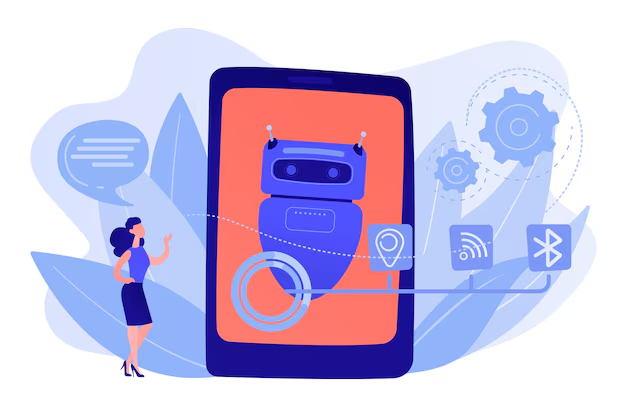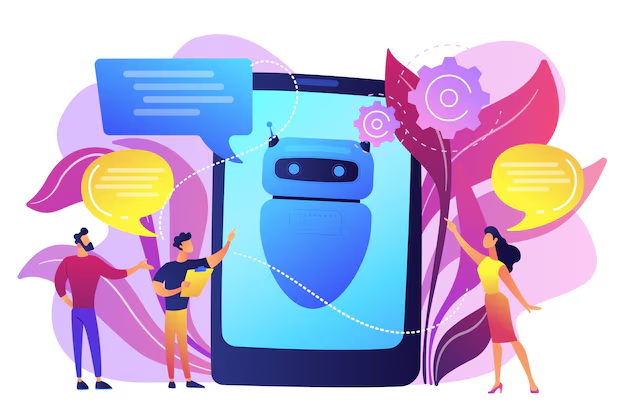In recent years, chatbots have emerged as one of the most innovative technologies reshaping the marketing landscape. These AI-powered tools are transforming how businesses interact with customers, automate processes, and drive engagement. From offering personalized experiences to improving efficiency and driving sales, chatbots are revolutionizing marketing strategies across industries. This article explores the myriad ways in which chatbots are revolutionizing marketing, their impact on customer experience, and the future potential of this technology.
The Rise of Chatbots in Marketing
Chatbots are AI-driven software programs designed to simulate conversation with users. Powered by machine learning, natural language processing (NLP), and data analytics, chatbots can engage with customers in real-time through text or voice, providing responses that mimic human-like interactions. Over the past decade, chatbots have evolved from simple automated tools to highly sophisticated digital assistants capable of handling complex tasks, making them a vital asset in modern marketing.
The global chatbot market is expected to grow rapidly, with predictions indicating that by 2025, it will reach $1.34 billion. This surge is largely due to the increasing adoption of chatbots across various industries, including retail, e-commerce, finance, healthcare, and hospitality. Businesses are recognizing the value of chatbots in enhancing the customer experience, streamlining operations, and improving marketing effectiveness.
1. Enhancing Customer Engagement
One of the key reasons chatbots are revolutionizing marketing is their ability to boost customer engagement. Engaging customers through personalized communication is essential for building brand loyalty and increasing sales. Traditional marketing methods, such as emails or static advertisements, often fail to capture customers’ attention in an interactive, meaningful way. Chatbots, however, offer a dynamic, 24/7 communication channel that fosters a more personal and engaging relationship with customers.
Chatbots can provide tailored recommendations, respond to inquiries, and offer real-time assistance. For example, in the e-commerce sector, chatbots can guide customers through the purchasing process, suggest products based on browsing history, and even offer promotions and discounts. The ability to deliver personalized, immediate responses enhances the customer experience and helps build stronger brand relationships.
2. Improving Lead Generation and Sales Conversion
In marketing, converting leads into customers is a constant challenge. Chatbots are playing a critical role in improving lead generation and sales conversion rates by automating much of the initial interaction with potential customers. Chatbots can qualify leads by asking specific questions and capturing important data such as contact details, preferences, and buying intent. Based on this information, chatbots can direct qualified leads to the appropriate sales team member or even complete a sale independently, depending on the complexity of the product or service.
By engaging customers early in the decision-making process and providing instant responses, chatbots prevent potential customers from dropping off during the research or buying stages. Additionally, chatbots can follow up with leads at optimal times, reminding them about products left in their shopping carts or offering personalized discounts to encourage final purchases. This proactive, personalized approach helps increase conversion rates and drive sales.
3. Reducing Response Time and Improving Customer Support
Another major advantage of chatbots in marketing is their ability to reduce response times and provide instant support to customers. Speed is critical in today’s digital economy, where customers expect quick resolutions to their queries. By leveraging chatbots, businesses can provide 24/7 customer service without the need for additional human agents.
Chatbots can handle a wide range of customer inquiries, from answering frequently asked questions (FAQs) to providing troubleshooting assistance. They can also assist with basic customer service tasks, such as order tracking, returns, or appointment scheduling. As a result, businesses can improve customer satisfaction by reducing waiting times and ensuring that help is always available.
Moreover, chatbots allow human agents to focus on more complex tasks that require emotional intelligence or problem-solving skills. By automating routine tasks, chatbots enhance operational efficiency, reduce customer service costs, and ensure that businesses can deliver timely support at scale.
4. Personalizing the Customer Experience
Personalization is at the heart of modern marketing. Customers today expect tailored experiences that cater to their individual needs and preferences. Chatbots, with their ability to analyze customer data in real time, provide businesses with an unprecedented level of personalization.
Through data analytics and machine learning, chatbots can track customer behavior, such as browsing history, purchase patterns, and interactions with the brand. Using this data, chatbots can create personalized conversations and recommend products or services based on the customer’s unique preferences. For example, if a customer frequently purchases sports equipment, a chatbot could suggest the latest product releases or offer discounts on items they are likely to need.
Personalization goes beyond product recommendations; chatbots can also engage customers with relevant content, reminders about promotions, and personalized greetings, making each interaction feel more meaningful. This level of customization helps businesses stand out in an increasingly crowded marketplace and create lasting relationships with their customers.
5. Streamlining Marketing Campaigns
Marketing campaigns require significant resources, from planning and execution to measurement and optimization. Chatbots can streamline this process by automating key aspects of campaign management, including lead nurturing, content distribution, and customer follow-ups.
For instance, chatbots can automatically send personalized messages to customers based on their interaction history or behavior on a website. If a customer abandons a shopping cart, a chatbot can send a timely reminder to encourage the customer to complete the purchase. Similarly, chatbots can automatically follow up with leads who have shown interest in a product but have not yet made a purchase, offering discounts or additional product information to drive conversions.
Furthermore, chatbots can be used to conduct market research by collecting feedback from customers. By asking relevant questions and analyzing responses, chatbots can help businesses refine their marketing strategies and gain valuable insights into customer preferences, behavior, and pain points.
6. Enhancing Omnichannel Marketing
In today’s multi-device, multi-platform world, customers interact with brands across various channels, including websites, social media, mobile apps, and messaging platforms. To stay competitive, businesses need to provide a consistent experience across all touchpoints. Chatbots are pivotal in achieving an omnichannel marketing strategy by seamlessly integrating with different platforms.
Chatbots can be deployed across multiple channels, such as Facebook Messenger, WhatsApp, and Slack, allowing customers to engage with brands in a way that is most convenient for them. By using AI, chatbots can also maintain context between conversations across different platforms, providing customers with a continuous and cohesive experience regardless of where they interact with the brand.
This omnichannel approach not only improves the customer experience but also increases brand visibility and accessibility, helping businesses reach customers on the platforms they frequent the most.
7. Leveraging Data for Smarter Marketing Decisions
Chatbots are a powerful tool for collecting and analyzing data. Every interaction with a chatbot provides valuable insights into customer behavior, preferences, and pain points. By leveraging this data, businesses can make smarter, data-driven marketing decisions.
For example, chatbots can identify common customer queries, complaints, or interests, allowing businesses to adjust their marketing strategies accordingly. Additionally, chatbots can track the success of marketing campaigns in real time, providing businesses with immediate feedback on what’s working and what isn’t. This ability to quickly gather data and adjust strategies on the fly is a major advantage for businesses looking to stay agile and responsive in a fast-paced market.
8. The Future of Chatbots in Marketing
As AI technology continues to evolve, chatbots will only become more sophisticated and capable. In the future, we can expect chatbots to engage in more advanced forms of interaction, including voice-based communication, video-based responses, and even augmented reality (AR) experiences.
One promising development is the integration of chatbots with other emerging technologies, such as virtual assistants (e.g., Amazon Alexa, Google Assistant) and Internet of Things (IoT) devices. This integration will create even more personalized and immersive customer experiences, allowing brands to deliver hyper-targeted marketing messages and offer solutions in real-time.
Furthermore, as natural language processing (NLP) improves, chatbots will become better at understanding and responding to complex customer queries, making interactions even more human-like. This will enable businesses to deliver highly effective, tailored marketing messages with a level of precision that was previously impossible.
Conclusion
Chatbots are revolutionizing marketing by transforming how businesses engage with customers, streamline processes, and drive sales. From improving customer engagement and providing instant support to personalizing experiences and enhancing omnichannel strategies, chatbots are reshaping the marketing landscape. As the technology continues to evolve, businesses that leverage chatbots will be better positioned to meet the demands of modern consumers, providing more efficient, personalized, and innovative marketing solutions. The future of marketing is undoubtedly conversational, and chatbots are at the forefront of this transformation.





